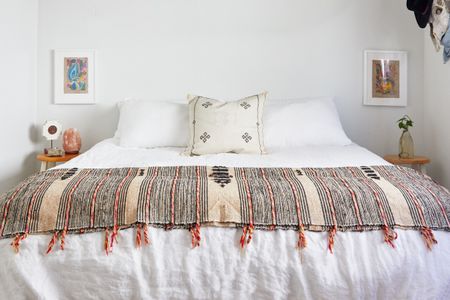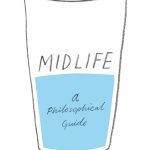If you want to change your life and maybe the world—start off by making your bed! -William H. McRaven
Four-star retired United States Admiral William H McRaven delivered an inspiring and thought-provoking commencement speech to the 2014 graduating class of the University of Texas at Austin.
Taking inspiration from the University of Texas slogan, “What starts here changes the world,” he shared the ten principles he learned during Navy Seal training that helped him overcome challenges not only in his training and long Naval career but also throughout his life. At the core of his message is the principle of Laying your Bed daily. In his speech, he noted:
If you want to change the world, start off by making your bed.
Every morning in basic SEAL training, my instructors, who at the time were all Vietnam veterans, would show up in my barracks room and the first thing they would inspect was your bed. If you did it right, the corners would be square, the covers pulled tight, the pillow centered just under the headboard and the extra blanket folded neatly at the foot of the rack — that’s Navy talk for bed.
It was a simple task — mundane at best. But every morning we were required to make our bed to perfection. It seemed a little ridiculous at the time, particularly in light of the fact that were aspiring to be real warriors, tough battle-hardened SEALs, but the wisdom of this simple act has been proven to me many times over.
If you make your bed every morning you will have accomplished the first task of the day. It will give you a small sense of pride, and it will encourage you to do another task and another and another. By the end of the day, that one task completed will have turned into many tasks completed. Making your bed will also reinforce the fact that little things in life matter. If you can’t do the little things right, you will never do the big things right.
And, if by chance you have a miserable day, you will come home to a bed that is made — that you made — and a made bed gives you encouragement that tomorrow will be better.
In his book inspired by the commencement speech, Make Your Bed: Little Things That Can Change Your Life…And Maybe the World, Admiral William H. McRaven writes:
In battle soldiers die, families grieve, your days are long and filled with anxious moments. You search for something that can give you solace, that can motivate you to begin your day, that can be a sense of pride in an oftentimes ugly world. But it is not just combat. It is daily life that needs this same sense of structure. Nothing can replace the strength and comfort of one’s faith, but sometimes the simple act of making your bed can give you the lift you need to start your day and provide you the satisfaction to end it right.
Remember… start each day with a task completed. Find someone to help you through life. Respect everyone. Know that life is not fair and that you will fail often. But if you take some risks, step up when times are toughest, face down the bullies, lift up the downtrodden, and never, ever give up—if you do these things, then you can change your life for the better… and maybe the world!
The Admirals’ advice of making your bed every morning is on point. I have experimented and included the practice in my daily routine and I can confirm that it is transforming my life. Making your Bed could be seen as a code for simple task completion. A similar concept of task completion was proposed by author Dr. BJ Fogg, in his book: Tiny Habits: The Small Changes That Change Everything. He called the art of laying your bed, tiny habits. He writes: Go Tiny –
If you haven’t gotten off the couch in a year, don’t start with seven minutes of strenuous activity. Start tiny instead. Shore up the weakest link in your Ability Chain by making your new workout habit radically easy to do. Scale back to doing one wall push-up. Just one. When you run into a setback—a cold, for instance—you can still manage to do one wall push-up, stuffy nose, and all. By going tiny, you create consistency; by staying tiny, you get your new habit firmly rooted.
We feel so pressed for time. This pressure leads to a scarcity mindset—we believe that there will never be enough time, so we say no to changes because we feel like we don’t have the hours to cultivate new positive habits.
With the Tiny Habits method, you focus on small actions that you can do in less than thirty seconds. You will quickly wire in new habits, and then they will grow naturally. Starting tiny means you can begin creating a big change without worrying about the time involved.
The more stressed you are and the less time you have, the more appropriate this method is for you. No matter how much you want to cultivate a healthy habit, you won’t be able to do it reliably if you start big. When you go big, the new habit probably won’t stick. In many people’s lives, tiny isn’t just the best option, it might be the only option.
By going tiny, you create consistency; by staying tiny, you get your new habit firmly rooted.
Aim Small
Canadian clinical psychologist and author of “12 Rules for Life”, Jordan B. Peterson shared the same sentiment on aiming small:
You don’t want to shoulder too much to begin with, given your limited talents, tendency to deceive, the burden of resentment, and ability to shirk responsibility. Thus, you set the following goal: by the end of the day, I want things in my life to be a tiny bit better than they were this morning. Then you ask yourself, “What could I do, that I would do, that would accomplish that, and what small thing would I like as a reward?” Then you do what you have decided to do, even if you do it badly. Then you give yourself that damn coffee, in triumph. Maybe you feel a bit stupid about it, but you do it anyway. And you do the same thing tomorrow, and the next day, and the next. And, with each day, your baseline of comparison gets a little higher, and that’s magic. That’s compound interest.
Do that for three years, and your life will be entirely different. Now you’re aiming for something higher. Now you’re wishing on a star. Now the beam is disappearing from your eye, and you’re learning to see. And what you aim at determines what you see. That’s worth repeating. What you aim at determines what you see.
What could I do, that I would do, that would accomplish that, and what small thing would I like as a reward?
Daily Rituals
Author John C. Maxwell noted “You will never change your life until you change something you do daily. The secret of your success is found in your daily routine.” We are what we do and not what we say. We get rewarded in public for what we consistently refine and master in private. These are the ways I make my bed on a daily basis:
Lay own Bed
One of the first things I do when I wake up is to lay my bed and in the process have a little sense of task completion. The sight of a well-laid bed makes me feel I have done something already.
Meditate
I started meditating consistently during the COVID-19 pandemic lockdown and that downtime came with anxiety and fear but with meditation and mindfulness, have learned to radically accept whatever comes up on a daily basis.
Journaling
I use two journals to record my thoughts and priorities: A daily planner and a gratitude journal. I record the top five things/priorities for the day in the daily planner and I use the gratitude journal for things am grateful for, daily affirmations, things I want to achieve for the day, and ways I can improve.
Calm Stretch/Press-up
After meditating, I use the Calm Apps morning wake up which is a combination of standing sequence and breathing exercise. After the stretch, I do some press-up.
Dress for Success
One routine I added to my daily ritual earlier this year is the way I dress when working from my home office. I started dressing up like am going to work and it has had a significant effect on my physiological and mental outlook.
Long-Form Writing
The first thing I do when I get to my office space is to do long-form writing (writing with a pencil on a yellow pad). I write about topics have read about, things that fascinate me, and topics I want to know more about. Most of the articles on this blog come from my daily morning-long form writing.
I am not close to where I want to be with my writing but the daily practice of sitting down to write for 30-40 minutes has been significant on my writing journey.
“It is easy to write. Just sit in front of your typewriter and bleed.” – Ernest Hemmingway
Start work
I start work after eating breakfast/brunch.
Listen to Audiobook
One activity I have been consistent with in the past 9-12 months is listening to audiobooks while working on a daily basis. It has been a game-changer for me as I am able to read more books and get things done in the process.
Outside walk/Gym Session
I try to incorporate an exercise routine into my day either by going to the gym during the cold seasons or by taking a walk or run during the warm seasons. I am always preparing for a marathon.
Listen to podcast/Documentary/Movie
On weekdays, I try to see a movie, documentary, or movie before I sleep. I have loads of programming I wish to watch about things that interest me such as Entrepreneurship, the 4th industrial revolution, Artificial Intelligence, Sports documentaries, etc.
Sleep
I try to get 7-8 hours of sleep daily. Some days I do not get that much sleep but I try.
Repeat
I try to consistently follow through on my daily routines and it has made all the difference. I am conscious of how and who I spend my time with as Life is Short and fleeting.
Following through on your goals, intentions, and aspiration can be tough as there is always something to distract you: the Internet, social media, news, entertainment, etc. The key to getting things done is to follow the Make your Bed strategy: Aim Small, Take baby steps and follow through. Decide what you want to get done, commit to getting it done and execute.
All the Best in your quest to get Better. Don’t Settle: Live with Passion.



Comments are closed.